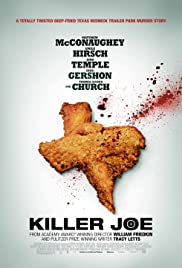
KILLER JOE
US, 2011, 104 minutes, Colour.
Matthew Mc Conaughey, Emile Hirsch, Juno Temple, Thomas Hayden Church, Gina Gershon.
Directed by William Friedkin.
Killer Joe is a grim film, adapted from his play by writer, Tracy Letts. It is a reminder that visual presentation of violence on stage is seen at a distance whereas in a film, it is in close-up, very much close-up for this film, many audiences considering that the film was too violent.
The story is set in Dallas, on the outskirts, a family which has not been well educated, finds it hard to make ends meet, a father with limited job opportunities, his wife having left him and taken up with another man, his marrying a woman who was a waitress at the local diner and, unbeknownst to him, having an affair with his ex-wife’s boyfriend. There is a young daughter at home, sometimes slow-witted. There is also a son who is living with his mother, clashes with her and is often kicked out. The protagonists are played by Thomas Hayden Church, Gina Gershon, Juno Temple and Emile Hirsch.
The young son proposes what might seem to be a good scheme but, because of ignorance, easy deception and limitations, turns out to be a harebrained scheme. The family is to hire an assassin, a local police detective, Killer Joe, played with extreme menace by Matthew Mc Conaughey.
The family doesn’t have enough money to pay the killer in advance and so make an arrangement that the daughter can be a retainer. Killer Joe is attracted by her and she to him, complicating the emotions and the situation. In the meantime, the son is being pursued by a local boss for payments which he cannot make, and is chased through the town.
The killer keeps his contract to the surprise of everyone, murdering the woman, her body in the boot of the car, a burial. Then he comes to the home and there is a dramatic confrontation, various emotional twists, the son wanting to take his sister away, the killer wanting her to stay – and a confrontation and shootings with the young woman holding the gun. And that is what the audience is left with.
40 years earlier William Friedkin had won an Oscar for The French Connection and two years after that made The Exorcist. His later career was one of ups and downs – including a film version of Bug, also based on a play by Tracy Letts who also wrote August, Osage County.
1. The title, expectations – and fulfilment?
2. The Dallas settings, Texas, poorer areas, homes, drugs, crime, the world of mechanics? The musical score?
3. The film based on a play, adaptation for the screen, opening up the sequences, yet so many of the scenes like plays, dialogue, confined to a single space?
4. The difference between stage violence and violence seen on screen? The close-up effect of the killings, the torture, blood?
5. The Smith family, their name, Texas people? Ansell, as a father, uneducated, his ex-wife? Her separation, drugs and her boyfriend? Christopher living with her, his violence, his being ousted? Ansell and his marrying Sharla, their home, Chris arriving, wanting the toilet? Chris and his seeming intelligence, but not? Dottie, simple, emotional, her living in the house?
6. The situation with the mother, Christopher and his plan, the discussions, Dottie overhearing, Sharla and her participation, the issue of the insurance policy, the contact with Killer Joe? The discussion, the secrecy, the equal number of shares? Sharla participating? Dottie knowing and agreeing?
7. The introduction to Joe, the detective, police, ruthless yet personally fastidious? His personality? The contracts, fees, the family able to pay or not, the suggestion that Dottie be given to him as a retainer, his accepting this? Christopher and Ansell and their various discussions, buying Dottie the new dress? Setting her up?
8. Joe, his style, arriving for the dinner, Dottie not wearing the dress, the attraction, her cooking? Joe and his provoking her, the sexual encounter, taking off the old clothes, the embrace, putting on the new dress, the dinner, Dottie and her table manners, Joe serving?
9. Christopher, his problems, the drugs, the bodyguards, the owner, the long chase through the streets and buildings, the attack, the owner and his smooth talk, the bodyguards bashing Christopher?
10. Christopher and Joe, having the money or not, Joe and his working on the bodyguards?
11. Sharla, in herself, first seen, semi-naked at the door for Christopher? Her relationship with Ansell? Her place in the household? Her work, the diner, Dottie coming to the meal, the discussions? The photos? The phone call to Rex? The later repercussions?
12. The death of the mother, her body in the boot of the car, sitting in the front of the car, the alcohol, the cigarette, the patrol trail, the fire and explosion?
13. Ansell and Sharla, going to meet the lawyer, the irony that the insurance policy was for Rex and not for Dottie? Ansell and Christopher slow to realise what had happened? Christopher and his naive beliefs?
14. Joe, the arrival, the confrontation? Challenging Sharla, her mentioning hundred dollars, her slip, Joe’s brutality, physical violence taught Sharla? Her denials? Producing the photos? Ansell, slow, his reaction?
15. Christopher, the plan to go away to Mexico with Dottie, her agreement, his arrival, sitting at the table?
16. The ultimate confrontation, Sharla being bashed, the chicken leg and the blow job? Joe, sitting them all at the table, Dottie? The subdued meal?
17. Christopher, the confrontation, ordering Dottie, Sharla stabbing him? Dottie getting the gun, Joe and Christopher and their commands? Her shooting, Ansell shot, Christopher dead?
18. The final close-up, the profiles of Joe and Dottie, her finger on the trigger – and the audience left with the consequences of her pulling the trigger with Joe’s death and her being by herself, or not shooting Joe and being with him?